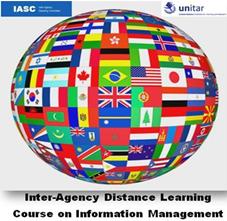
The Inter-Agency Standing Committee (IASC) - which is the main forum for coordination, policy development and decision-making between key UN and non-UN humanitarian partners - and UNITAR’s Public Finance and Trade Programme successfully concluded the first online course on information management. Forty-four (44) professionals from key UN and non-UN agencies successfully completed this course which aimed at improving their knowledge of how information management can enhance humanitarian action, thereby contributing to improved decision-making in the inter-agency humanitarian response context.
The e-Learning course on “Information Management in Humanitarian Crises” took place from April 26 to June 17, 2011. It had 57 participants from key UN and non-UN agencies in the area of humanitarian response both from headquarters and the field and was mentored by an international team of 11 humanitarian coordination experts. This course combined self-study, mentored online discussions, and self-assessments with the aim of providing participants high quality training, knowledge sharing and networking in a flexible and cost-effective way.
The diversity of participants rendered very lively and insightful discussions about topics such as information challenges in humanitarian emergencies, different approaches to information management in the inter-agency context, and practical issues related to the collection and analysis of data and information.
On the whole, participants provided very positive feedback on the course, below is a comment from a course participant:
“The course broadened my understanding of humanitarian information management. I will comment on the course material and methodology which was one of the best I have ever seen. It was easy to follow and understand and very much relevant. Now I can say that I able to do Information Management in humanitarian situation in more effective way to support necessary decision making in Humanitarian response.” Mr. Ehsan Ullah, UNICEF, Pakistan.
This course focused on a very particular and specialized type of information management, specifically, the processes involved in managing the information required to carry out an effective and efficient emergency response. These responses, which may address the needs of hundreds of thousands or even millions of affected persons, combine the efforts of a wide variety and often large number of humanitarian actors: aid agencies, governments, donors, media and individuals around the world. Everyone involved is looking for answers to often very complex questions about how best to help those who are in need. As a result, there is a great demand for skilled individuals to support humanitarian coordination efforts by helping to collect, consolidate, analyze and share the most important information available.
For more information about the Inter-Agency Standing Committee (IASC), please visit: http://www.humanitarianinfo.org/iasc
For more information about UNITAR e-Learning courses in the areas of public finance and trade, please visit: http://www.unitar.org/pft/event.

